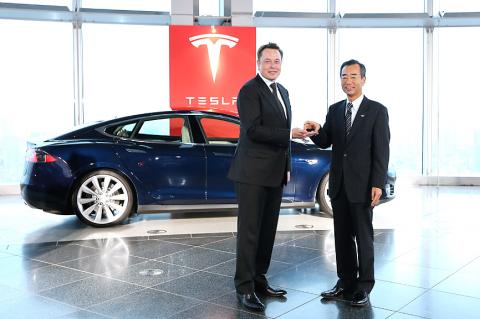US electric car maker Tesla Motors Inc is developing technology that could see vehicles run on “full autopilot” in as little as five or six years, chief executive Elon Musk said.
Musk said his firm was stepping on the accelerator in the race against rivals such as Google Inc and Volvo Car Corp to create a driverless car, which could revolutionize the road by drastically cutting traffic collision mortality rates.
“The overall system and software will be programmed by Tesla, but we will certainly use sensors and subcomponents from many companies,” Musk told reporters in Tokyo on Monday. “I think in the long term, all Tesla cars will have autopilot capability.”

Photo: Bloomberg
There are no self-driving cars on the market yet, but several automakers have been working on autonomous or semi-autonomous features, such as self-parking, which are seen as a major advance for the auto sector.
Musk’s comments suggest that the arrival of self-driving cars could be closer than previously thought; a January report by the research firm IHS said they could start hitting highways by 2025 and number as many as 35 million globally by 2035.
On Monday, Musk also said electric carmaker Tesla hopes to sign a new battery supply deal with Toyota Motor Corp in the next few years, as an existing program comes to an end.
Musk was in Tokyo to announce the release of Tesla’s Internet-connected Model S sedan in Japan.
The luxury electric car costs ¥8.23 million (US$77,500) and comes equipped with batteries made by Panasonic Corp.
The electric car market in Japan, as in other countries, has been growing slowly, hindered by high prices and a lack of locations for drivers to charge vehicle batteries.
Meanwhile, California drivers are fueling the sale of rechargeable cars in the US with more than 100,000 sold in the state in the past four years, representing about 40 percent of the US plug-in market.
Sales of hybrid and battery-only cars in California totaled 102,440 in the period from December 2010 through last month, the California Plug-In Electric Vehicle Collaborative said yesterday, citing figures from the California Air Resources Board, Hybridcars.com and Baum & Associates. Over the same time frame, about 250,000 rechargeable autos were sold in the US, according to industry researcher Baum.
California has since the 1970s pressured automakers to offer vehicles with lower tailpipe emissions to curb smog and poor air quality.
Beginning in 2009, the state has set tougher new standards requiring cars that emit less carbon pollution under its Zero-Emission Vehicle program, leading to a new generation of plug-in models from General Motors Co, Ford Motor Co, Nissan Motor Co and Tesla.
At least 10 percent of rechargeable car sales in California belong to Tesla, which was started in 2003 and produces the Model S. Sales of the sedan have totaled 10,834 over the 18 months through June 30.
Additional reporting by Bloomberg

SEMICONDUCTORS: The German laser and plasma generator company will expand its local services as its specialized offerings support Taiwan’s semiconductor industries Trumpf SE + Co KG, a global leader in supplying laser technology and plasma generators used in chip production, is expanding its investments in Taiwan in an effort to deeply integrate into the global semiconductor supply chain in the pursuit of growth. The company, headquartered in Ditzingen, Germany, has invested significantly in a newly inaugurated regional technical center for plasma generators in Taoyuan, its latest expansion in Taiwan after being engaged in various industries for more than 25 years. The center, the first of its kind Trumpf built outside Germany, aims to serve customers from Taiwan, Japan, Southeast Asia and South Korea,

Gasoline and diesel prices at domestic fuel stations are to fall NT$0.2 per liter this week, down for a second consecutive week, CPC Corp, Taiwan (台灣中油) and Formosa Petrochemical Corp (台塑石化) announced yesterday. Effective today, gasoline prices at CPC and Formosa stations are to drop to NT$26.4, NT$27.9 and NT$29.9 per liter for 92, 95 and 98-octane unleaded gasoline respectively, the companies said in separate statements. The price of premium diesel is to fall to NT$24.8 per liter at CPC stations and NT$24.6 at Formosa pumps, they said. The price adjustments came even as international crude oil prices rose last week, as traders

Taiwan Semiconductor Manufacturing Co (TSMC, 台積電), which supplies advanced chips to Nvidia Corp and Apple Inc, yesterday reported NT$1.046 trillion (US$33.1 billion) in revenue for last quarter, driven by constantly strong demand for artificial intelligence (AI) chips, falling in the upper end of its forecast. Based on TSMC’s financial guidance, revenue would expand about 22 percent sequentially to the range from US$32.2 billion to US$33.4 billion during the final quarter of 2024, it told investors in October last year. Last year in total, revenue jumped 31.61 percent to NT$3.81 trillion, compared with NT$2.89 trillion generated in the year before, according to

SIZE MATTERS: TSMC started phasing out 8-inch wafer production last year, while Samsung is more aggressively retiring 8-inch capacity, TrendForce said Chipmakers are expected to raise prices of 8-inch wafers by up to 20 percent this year on concern over supply constraints as major contract chipmakers Taiwan Semiconductor Manufacturing Co (TSMC, 台積電) and Samsung Electronics Co gradually retire less advanced wafer capacity, TrendForce Corp (集邦科技) said yesterday. It is the first significant across-the-board price hike since a global semiconductor correction in 2023, the Taipei-based market researcher said in a report. Global 8-inch wafer capacity slid 0.3 percent year-on-year last year, although 8-inch wafer prices still hovered at relatively stable levels throughout the year, TrendForce said. The downward trend is expected to continue this year,